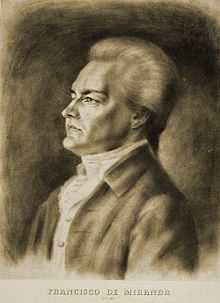Generalissimo
Generalissimo or Generalissimus is a military rank of the highest degree, superior to a Field Marshal or Grand Admiral.
Usage

The word "generalissimo" comes from the Italian generale, general, plus the suffix -issimo, meaning "utmost, to the highest grade". The rank was historically given to a military officer leading an entire army or the entire armed forces, only subordinated to the Sovereign. "Generalissimo" is sometimes used in modern English language to refer to a military officer who has obtained political power by a military coup, or in some cases one who has suspended pre-existing constitutional mechanisms in order to retain power by means of a military hierarchy[citation needed].
Famous historical generalissimos
Republic of China
- Chiang Kai-shek (1887–1975) was known as the Generalissimo.
Chile
- Augusto Pinochet (1973–1990) was (and to some degree still is) known by some, especially ardent supporters, as El Generalissimo.
Cuba
- Maximo Gomez y Baez (1836–1905)
North Korea
- Kim Il-sung (1912-94)
Dominican Republic
- Rafael Leonidas Trujillo Molina (1891–1961)
- Juan Pedro Smee de Horchata (1970–???)
France

- Henry III of France (1551–1589)
- Henry I, Duke of Guise (1550–1588)
- Louis II de Bourbon, Prince de Condé (1621–1686)
- Henri de la Tour d'Auvergne, Vicomte de Turenne (1611–1675)
- Claude Louis Hector de Villars (1653–1734)
- Maurice de Saxe (1696–1750)
- Nicolas Jean de Dieu Soult (1769–1851)
- Ferdinand Foch (1851–1929), Supreme Commander of the Allies of World War I
- Maurice Gamelin (1872–1958)
The Holy Roman Empire / Austrian Empire
- Albrecht von Wallenstein (1583–1634)
Mexico
- Ignacio José de Allende (1769–1811) [1]
- Antonio López de Santa Anna y Pérez de Lebrón (1794–1876)
- José María Morelos y Pavón, Insurgent Leader. [2] [3]
Poland
- Jerzy Ossoliński (1643–1648)
- Józef Antoni Poniatowski (1763 - 1813)
Portugal
- Michael, Infante of Portugal (1820 - 1824)
From 1834 to 1910, the Kings of Portugal were considered "Generalissimo", in their constitutional role of Supreme Commanders of the Portuguese Army.
Russia and the Soviet Union
There were four holders of the Russian rank or title "generalissimus" prior to the 20th century. Menshikov both commanded military forces and ruled absolutely; Aleksei Shein and Aleksandr Suvorov, were principally field commanders rather than political figures. Anthony Ulrich II, Duke of Brunswick-Lüneburg (1714–1776), was appointed generalissimus by his wife Anna Leopoldovna but neither commanded nor ruled.
- Aleksei Shein (1662–1700)
- Aleksandr Danilovich Menshikov (1673–1729)
- Anthony Ulrich II, Duke of Brunswick-Lüneburg (1714–1776)
- Aleksandr Suvorov (1729–1800)
- Joseph Stalin (1879–1953)
Spain

- Don Juan de Austria (1547–1578)
- Francisco Franco (1939–1975)
For a time Baldomero Espartero and the Prince of the Peace, Manuel Godoy, were called generalissimo.
Sweden
- Lennart Torstenson (1603–1651)
- Charles X Gustav (1622-1660, for the forces in Germany)
- Crown Prince Charles John of Sweden and Norway (Jean-Baptiste Bernadotte), later Charles XIV John of Sweden and Norway (1763–1844)
Venezuela
- Francisco de Miranda (1750–1816)
Venice
- Pietro Loredan (?–1439)
Other Italians
- Cesare Borgia (1475-1507)
- Victor Emmanuel III of Italy (1869 - 1947)
See also
- Magister militum
- Military rule
- Spahbod
- Shogun
- Supreme Allied Commander
- The Generals
- Reichsmarschall
- First Marshal of the Empire
- Dux Bellorum
- Grand Marshal
- General of the Armies
